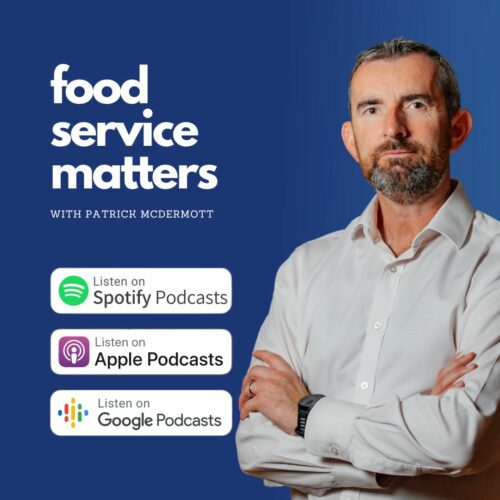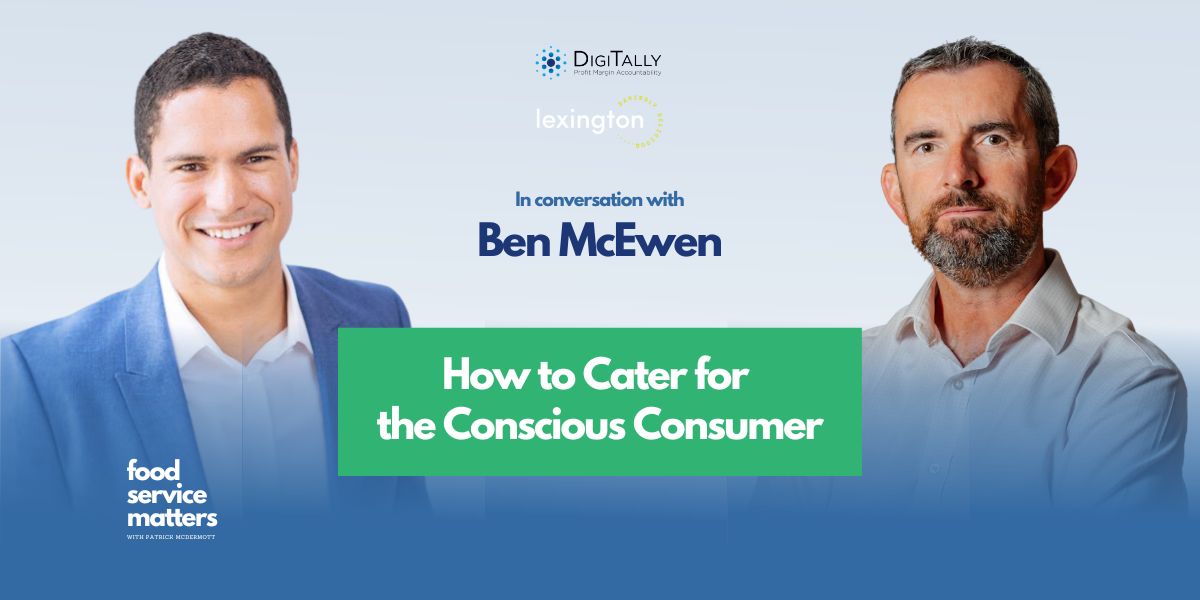With consumers increasingly calling for ethically sourced menu options and sustainability in business practices, food service companies cannot help but make this a key part of their strategy.
In episode seven of the Food Service Matters podcast, host Patrick McDermott interviews Ben McEwen, Sales Director of Lexington, an innovative company that provides catering and reception services for businesses and independent schools.
In this article, we share Ben’s insights into what conscious consumers want and explore how food service businesses can respond to today’s evolving customer values.
Meet the demand for sustainable menu options
Ben highlights that there is rising consumer demand for transparency around ingredients and supply chains. He notes, “People are keen to understand the sustainable credentials behind the products we’re serving.”
This mindset is evident not only among customers but also staff beginning their careers in the catering industry. Ben adds, “The generation that’s coming into the workforce now is extremely vocal around issues of sustainability. They want to see products with purpose.”
Ben also observes that there’s been a shift in customer expectations in recent years. Whereas customers in the past expected the produce they desired to be on menus all year round, today’s conscious consumers want more seasonal, local offerings. He highlights, “People are prepared to accept that things might not be available because they’re not in season.” Ultimately, this change allows businesses to make more eco-conscious decisions when menu planning.
Partner with ethically sourced brands
Another way of meeting these consumer demands is through ethical collaborations. Ben explains how Lexington employees with strong environmental, social and corporate governance (ESG) interests regularly meet up to put forward suggestions for sustainable company initiatives.
One example is Lexington’s exclusive partnership with PACT Coffee, an association of female coffee producers in Brazil. As Ben points out, “In what’s traditionally quite a male-dominated industry, it’s unusual and refreshing to see a female cooperative driving such a fantastic product.”
Ben explains how Lexington also has a long-standing partnership with the social enterprise Change Please, which trains homeless people to become baristas. Aiming to end the cycle of homelessness, this charity not only offers education and support but also helps its graduates find jobs.
Lexington drives revenue by supplying Change Please coffee at their locations, as well as hiring graduates to work for them. By choosing to spend money on these ethical brands, conscious consumers can both support sustainability initiatives and the financial viability of the organisation’s ESG efforts.
Showcase core company values
Informing consumers about sustainable and ethical company efforts is also key. As Ben adds, “It’s important that we communicate openly about what we’re doing.” Messaging on social media platforms, websites and even on menus are some ways of sharing what’s going on behind the scenes.
Food service businesses can also leverage ethical values in sales conversations to stand out among competitors. Ben explains that sustainability credentials take up a growing share of scoring contracts when securing new business. This means Lexington’s eco-conscious practices become a competitive advantage, helping to attract modern consumers at both organisational and individual levels.
It seems that for food service players looking to retain consumer and client loyalty moving forward, an ethical, eco-friendly approach is essential. As Ben summarises, “People are really interested and passionate about the environment, so we have to respond to that.”
From ensuring sustainable produce on menus to partnering with ethical brands, companies like Lexington are paving the way for the food service industry to meaningfully cater to the conscious consumer.
To listen to Patrick’s full interview with Ben McEwen, check out the Food Service Matters podcast on Spotify, Apple Podcasts or Google Podcasts.
Patrick is CEO of DigiTally, which is playing an increasingly important role as an intuitive and interconnected simple food service software that helps save time, increase margins and combat food waste. Keen to learn more? Let’s talk! Book a 30-minute call with Patrick and get your demo set up today.




